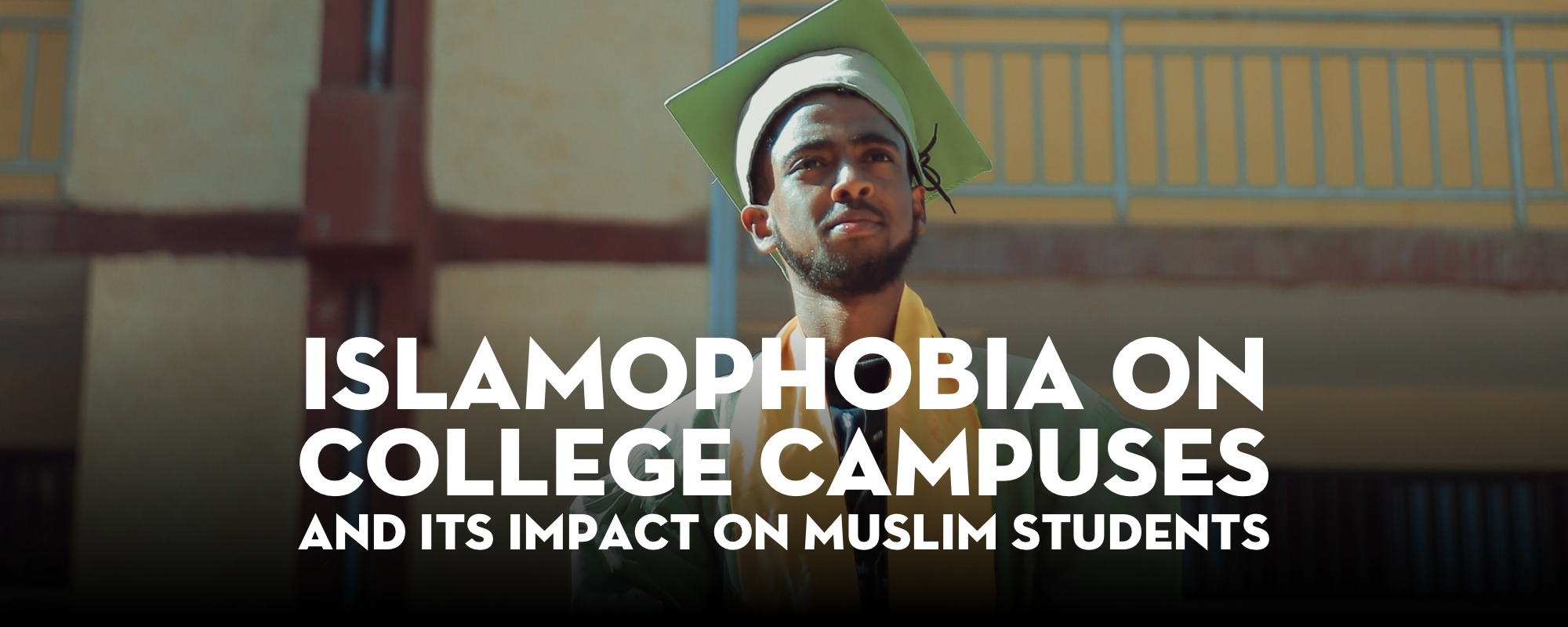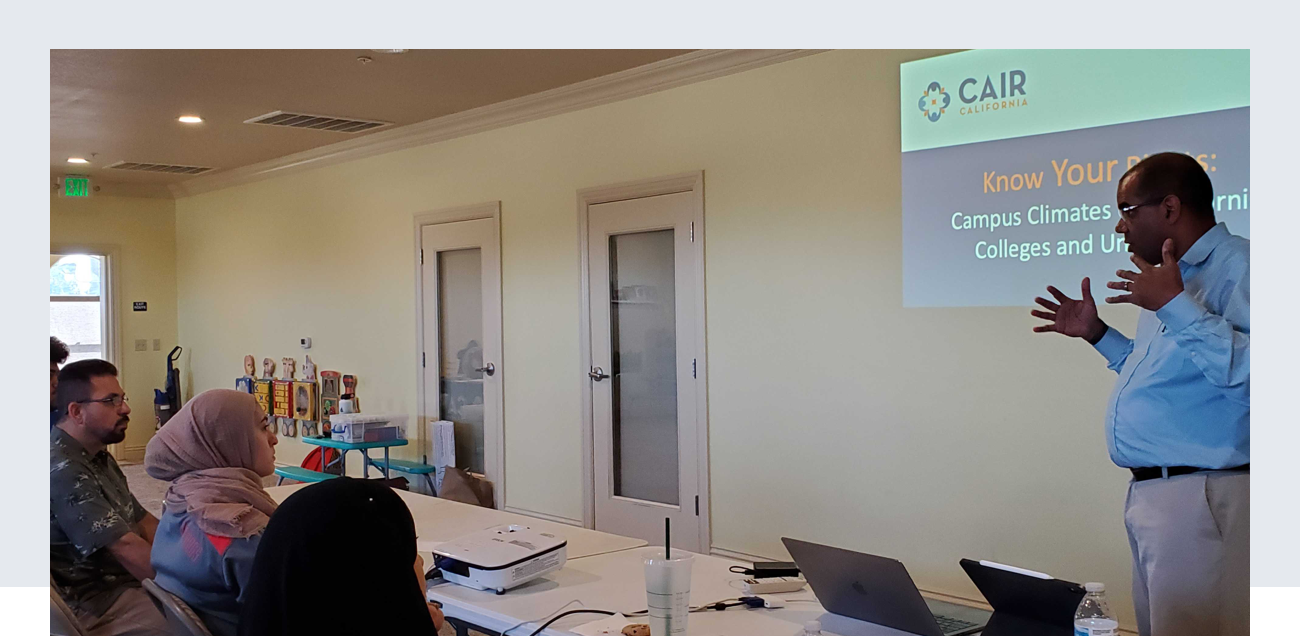
In this report, the California Chapter of the Council on American-Islamic Relations (CAIR-CA) presents its analysis of a 2019-2020 college campus climate survey of American Muslim college and university students.
The survey was administered to students at over sixty institutions of higher learning primarily throughout the state of California, including both public and private universities and colleges. Its purpose is to examine the lived experiences of American Muslim college students and the issues they face, particularly as a consequence of their real or perceived Muslim identities.

The survey findings indicated that 92.68% of schools have
a Muslim Student Association or similar organization on
campus. Despite the visibility of Muslim organizations on
school campuses, a significant majority of respondents,
74.07%, stated that their schools failed to make
statements, accommodations, or otherwise address
the effects of significant policy issues impacting the
Muslim community. Of the roughly 25% who responded
affirmatively, 21.37% found that when schools responded,
the responses were inadequate.
This data was further supported by other responses in
which many students relayed that their school failed to
respond adequately to Islamophobic or divisive events
on campus. For example, 35.71% of students reported
that speakers with Islamophobic or divisive agendas were
permitted to speak on campus, and 24.85% of students
believed their school’s response to these events was
inappropriate.
22.13% of respondents revealed that their schools failed
to respond to religious requests for accommodation, like
providing prayer and wudu rooms or addressing student
concerns about finals during the month of Ramadan.
14.55% of students disagreed or strongly disagreed
that their schools responded reasonably to cases of
religious discrimination or bias and 15.37% of students
also disagreed or strongly disagreed that their schools
responded reasonably to Islamophobic hate propaganda
or graffiti. Another 12.45% of students disagreed or
strongly disagreed that schools provided administrative
support for Muslim-related events.
Additionally, students expressed concern regarding
campus surveillance and privacy. Over 25% of students
stated they were concerned about being subjected
to intelligence gathering and surveillance on campus.
21.18% of students were also concerned about their
privacy and confidential information related to their
participation in student organizations or presence on
campus. A small number of students, 3.76%, reported
being approached by law enforcement on campus
regarding their campus activities or religious practices.
73.71% Verbal/Written 19.32% By School Staff or Personnel 6.97% Physical or Violence
Harassment and Discrimination DUE TO RELIGIOUS IDENTITY
TWEET THIS
The survey findings showed that a disconcerting
number of Muslim students experienced harassment or
discrimination based on their religious identity. Nearly
40% of all respondents confirmed that they experienced
this form of harassment or discrimination. Of these
students, 73.71% experienced a form of verbal or written
harassment or discrimination, which included derogatory
remarks or gestures, unfair or biased comments in the
classroom, name calling, putdowns, insults, derogatory
emails, texts, or social media posts, online harassment,
derogatory graffiti, or threats to report them to law
enforcement. Another 19.32% experienced harassment or discrimination by the school staff or personnel,
which included being unfairly graded, unjustly stopped
by school police, experiencing retaliation by school
administration, and denial of student services, including
physical or mental health services. Another 6.97% of
students experienced physical harassment or violence
to their person or possessions, which included physical
violence, unwanted contact, pulling or tugging on their
religious attire, and property damage.
[1] 25.5% Teacher’s Class Discussions Regarding Islam [2] 18.75% Speaking up Regarding Their Muslim Identity [3] 53.54% Bigoted Comments From Other Students [4] 33.55% Bigoted Comments From Their Teachers
REPORTED UNCOMFORTABLE EXPERIENCE IN THE CLASSROOM
TWEET THIS
Several students provided their own accounts of harassment and discrimination, ranging from microaggressions related to their religion, religious attire, appearance, or ethnicity, to being labeled a terrorist. Some survey comments also stated that schools adopted resolutions targeting Muslim or Palestinian groups.
73.22% Verbal/Written 18.58% By School Staff or Personnel 8.20% Physical or Violence
Harassment and Discrimination Due to Advocacy
TWEET THIS
Nearly 30% of Muslim students reported harassment
or discrimination due to their advocacy on issues
related to their Muslim identity. 73.22% of students
who experienced this harassment or discrimination
experienced it in the form of verbal or written harassment
and 18.58% experienced it in the form of harassment or
discrimination by the school staff, or personnel. 8.20%
of students reported physical harassment or violence to
their person or possessions.
A troubling trend in our survey findings revealed that
students who advocated on behalf of pro-Palestinian
issues were subjected to particularly egregious or
persistent forms of harassment and discrimination. For
example, 39.66% of students stated that there were
tensions on campus related to their advocacy for the
Boycott, Divestment, Sanctions (BDS) movement and
Palestinian rights. Several respondents reported that
they were slandered, attacked, and targeted for smear
campaigns based on their advocacy. Several others
reported harassment, intimidation, and verbal threats
by pro-Zionist groups, who at times disrupted Muslim or
pro-Palestinian events as an intimidation tactic. Some
students feared their schools routinely failed to respond
to these attacks based on heavy investments by pro-Zionist individuals or organizations.

Muslim students experienced a significant level of
discomfort expressing their political opinion in campus
settings. In fact, in every campus setting surveyed,
Muslim students reported feeling less comfortable than
comfortable expressing their political opinions. For
example, in cafeterias, libraries, student union buildings,
open air spaces, dorms, recreation halls, and in club
meetings, 40% to roughly 48% of students disagreed or
strongly disagreed that they were comfortable expressing
their political opinions.
Muslim students did not fare much better in the classroom
with 39.68% disagreeing or strongly disagreeing that they were comfortable expressing their political opinions.
In gymnasiums, 39.35% disagreed or strongly disagreed
The classroom presented its own challenges to Muslim
students who reported discomfort with how their
identity or faith was represented or addressed. 35.95%
of students surveyed reported that they were not
comfortable with the representation of Islam in class
texts and materials. A further 25.5% of students were
also uncomfortable with their professor or instructor’s
class discussions regarding Islam. 18.75% of students
stated they were uncomfortable speaking up in class
regarding their Muslim identity. Additionally, a staggering
53.54% of Muslim students were subjected to bigoted
comments about Islam from other students, while 33.55%
of students were subjected to bigoted comments about
Islam from their professors or instructors.
The discomfort felt by Muslim students within the
classroom was also articulated outside the classroom,
particularly when seeking student services. 22.64% of
Muslim students experienced discomfort seeking student
services, which included mental health counseling,
physical health services,23 academic services, and career
services. Others surveyed stated that they concealed or
avoided disclosing their Muslim identity due to fear of
negative consequences, harassment, or discrimination.24
12.87% of Muslim students reported feeling unsafe on
campus, and 6.58% of all respondents were victims of
some form of physical assault on campus. A significantly
larger percentage of students, 24.38%, were victims
of verbal assaults, with some students indicating
the assaults included Islamophobic speech or were
perpetrated by pro-Zionists, Trump supporters, or right
leaning conservatives. 25.52% of students witnessed
other Muslim students being physically harassed
on campus or school sponsored events due to their
religious identity. An even greater percentage, 31.83%,
reported witnessing other Muslim students being verbally
harassed due to their religious identity. Another 24.48%
of students were harassed on college related online
platforms due to their Muslim identity.
[1] 71.13% Participated in some form of MSA or MSU [2] 4.6% Participated in Students for Justice in Palestine [3] 3.56% Participated in a PSA (Pakistani or Persian Student Association)
Students Participated in Campus Organizations
TWEET THIS
35.71% Affirmed 64.29% Denied
Other groups on campus bringing Islamophobic or divisive speakers
TWEET THIS
12.32% School’s response was appropriate 24.85% School’s response was inappropriate 62.83% Did not find the question applicable
was your school's response to islamophobic or divisive speakers appropriate?
TWEET THIS
[1] 60.34% There were no tensions [2] 39.66% There were tensions
tensions on campus related to the
BDS movement or Palestinian rights
TWEET THIS
[1] 25.93% Took steps to address policy issues [2] 74.07% Did not address policy issues
Schools made statements, accommodations, or otherwise
addressed the effects of significant policy issues impacting the Muslim
community
TWEET THIS
[1] 19.10% Derogatory remarks or gestures [2] 18.89% Unfair or biased comments in class [3] 14.58% Verbal harassment including name calling putdowns or insults [4] 6.78% Derogatory emails, text or social media posts [5] 6.37% Online Harassment [6] 4.72% Derogatory Graffiti [7] 1.64% Threat to expose or report them to law inforcement [8] 3.90% Threats of physical violence or unwanted contact
STUDENTS EXPERIENCED Verbal and Written Harassment or Discrimination Due to Religious Identity
TWEET THIS
[1] 13.26% Derogatory remarks of gestures [2] 10.65% Verbal Harassment, including name calling [3] 9.35% Unfair or biased comments in class [4] 8.70% Online Harassment [5] 5.87% Derogatory emails, texts, social media [6] 3.26% Derogatory graffiti [7] 3.04% Threats to expose or report to law [8] 4.13% Threats of physical violence or unwanted contact
STUDENTS EXPERIENCED Verbal and Written Harassment or Discrimination due to Advocacy
TWEET THIS
31.9% Agreed or Strongly Agreed that their school responded reasonably 15.37% Disagreed or Strongly Disagreed 28.79% Remained Neutral 23.93% N/A
STUDENT COMFORT LEVEL IN School responses to Islamophobic Hate Propaganda or Graffiti on Campus
TWEET THIS
30.56 Agreed or Strongly Agreed 39.68% Disagreed or Strongly Disagreed 25% Remained Neutral 4.76% N/A
I feel comfortable expressing my political opinion in the classroom
TWEET THIS
23.62% Agreed or Strongly Agreed 43.25% Disagreed or Strongly Disagreed 24.6% Remained Neutral 8.53% N/A
I feel comfortable expressing my political opinion in the dining areas
TWEET THIS
19.8% Agreed or Strongly Agreed 43% Disagreed or Strongly Disagreed 29% Remained Neutral 8.20% N/A
I feel comfortable expressing my political opinion in student union bulding
TWEET THIS
24.26% Agreed or Strongly Agreed 44.93% Disagreed or Strongly Disagreed 24.85% Remained Neutral 5.96% N/A
I feel comfortable expressing my political opinion in open spaces
TWEET THIS
19.49% Agreed or Strongly Agreed 40.75% Disagreed or Strongly Disagreed 24.45% Remained Neutral 15.31% N/A
I feel comfortable expressing my political opinion in dorms and rec halls
TWEET THIS
[1] 17.54% Strongly Agreed that they felt comfortable speaking up in class [2] 37.3% Agreed [3] 26.41% Remained Neutral [4] 13.1% Disagreed [5] 5.65% Strongly Disagreed
STUDENT COMFORT LEVEL Speaking Up in Class regarding Islam and their Muslim identity
TWEET THIS
[1] 17.27% Agreed [2] 31.53% Neutral [3] 23.9% Disagreed [4] 12.05% Strongly Disagreed [5] 8.43% Question did not Apply [6] 6.83% Strongly Agree
I am comfortable with the representation of Islam used in class texts and materials.
TWEET THIS
[1] 21.29% Agreed [2] 35.14% Remained Neutral [3] 18.07% Disagreed [4] 12.45% Question did not Apply [5] 7.43% Strongly Disagreed [6] 5.62% N/A
I am comfortable with the way my professors or other instruction have discussed Islam in class
TWEET THIS